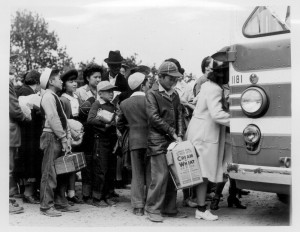Diversity, Rivalry, Democracy
February 19, 2013February 19 is a Day of Remembrance. Use these resources to find out why.

February 19 is a Day of Remembrance.
It is remembered annually at the Smithsonian Institution and in many Japanese American communities. On February 19, 1942, President Franklin D. Roosevelt signed Executive Order 9066, preparing the way for 120,000 Japanese and Japanese Americans, two-thirds of them U.S. citizens, to be taken from their homes on the West Coast and relocated to internment camps during WWII.
Forty years later, the Commission on Wartime Relocation and Internment of Civilians concluded that the evacuation and internment were not justified by military necessity but were prompted rather by “race prejudice, war hysteria, and a failure of political leadership.”
What does rivalry have to do with this episode of history? By 1941 Japanese immigrants had become quite successful in farming in the western states. Some historians have suggested that rivalry over land ownership and agricultural markets caused a tide of resentment that played a part in the evacuation and internment. Fear of economic rivalry also comes up in the debate over immigration today.
In a nation where diversity presents ever-growing challenges to our democracy, there are lessons we need to learn. Here are some good sources:
- Smithsonian Asian Pacific American Center: http://apa.si.edu/
- Manzanar National Historic Site, National Park Service: http://www.nps.gov/manz/
- National Diversity Education Program, Japanese American National Museum: http://www.janm.org/education/ndep/
In February and March, Indiana Humanities is exploring the topic of “rivalry,” as part of its Spirit of Competition theme. This post was written by Nancy Conner, director of grants and coordinator of Novel Conversations. Her family was interned at Manzanar and Minidoka, also a National Historic Site


